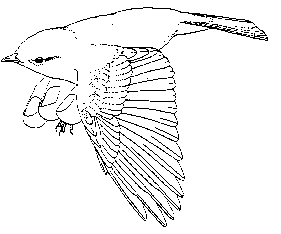Ringing courses
 | |
The main idea of ringing courses is to train and to examine people applying for ringing license. The course usually lasts 6-8 days; two parts are included. The first part takes place in the Ornithological Station, the second at the ringing station. Lectures of the first part include safety and ethics of ringing, catching methods and identification of birds. The few abilities are examined during this part: the use of EURING-code age system, knowledge of "Instruction of ringing" and correctness of preparing the ringing documentation (candidates receive all the materials before the course). The exam in bird identification takes place at the ringing station. The result of the exam generally amounts to the rule: "Ringer has the right not to know something, but cannot make a mistake". Consequently, a mistakenly identified bird during exam is a disqualification, but birds left undetermined are not judged negatively.
Required knowledge area
Either people knowing birds from the literature or from own experience can become ringers. Candidate must know or know how to search for species, age and sex-identification features in the guide of the birds he rings. He / she also should know the identification features of similar species, with which the misidentification is possible. The latin names are required (these are exclusively used in reports) and the morphological terminology which is used in the identification process.
The following people can be qualified for the ringing course:
1. Do know birds well, especially species for which they apply.
2. Guarantee absolute reliability in collecting and presenting scientific data.
3. Have finished 18 years of age.
4. Took part in the ringing activities at the ringing stations, preferably these of ringing teams like e.g. KULING.
The application for the ringing course should include:
1. Declaration of co-working with the Ornithological Station, with separate statement that candidate guarantees absolute reliability in collecting and presenting scientific data, and, that he / she will accept Station's conditions of co-working.
2. Filled questionnaire.
3. Opinion of ringing teacher, who lead the candidate's practice (ringing teacher must be informed before that he / she will be asked for opinion). Opinion should be prepared on a questionnaire obtained from the Station. If for some reasons candidate is not able to deliver opinion, he / she can be qualified for the course under agreement of the person responsible for the recruitment. In such cases "Opinion" is prepared by the person leading the course.
4. Information about ringing plans: what birds and in what number candidate intends to rings, individually or within ringing teams, supporting the research subject.
The exact information on course organization and materials for "homework" practice are obtained by candidates before the course.
If you would like to ring birds and you think your have enough knowledge to join ringing course, contact with Tomasz Mokwa.
Ringing license
Obtaining the ringing license is mainly based on the results of the exam on species, age and sex identification, but also knowledge of the "Regulations of Ringing" and "Instruction of Ringing". It can include selected species, groups of species or nestlings of selected or all species, depending on qualifications and declaration made.

